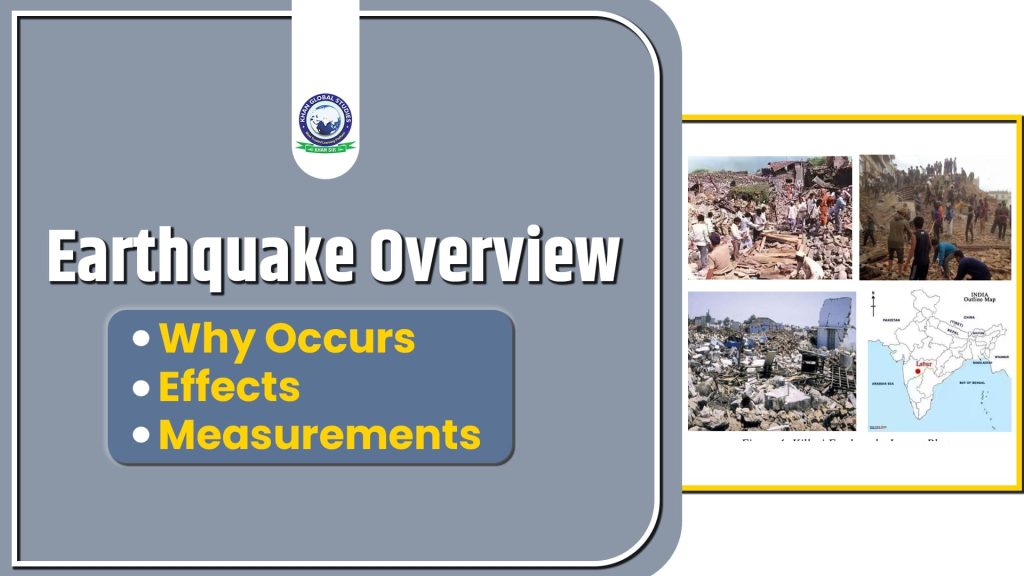
Earthquake is the shaking of the earth’s surface. This happens due to seismic waves generated due to the sudden release of energy in the Earth’s lithosphere. Earthquakes can be very violent and have the potential to range from toppling and injuring people to destroying entire cities in a matter of seconds.
Why do Earthquakes Occur?
There are 7 plates inside the Earth, which keep rotating continuously. The area where these plates collide is called a fault line. The corners of the plates bend due to repeated collisions. When too much pressure builds up the plates begin to break. The energy below finds a way out and the disturbance is followed by an earthquake.
Meaning of Earthquake Centre and Intensity
The epicentre of an earthquake is the place just below which geological energy is released due to movement in the plates. Earthquakes vibrations are more intense at this place. As the frequency of vibration increases, its effect decreases. However, if an earthquake of magnitude 7 or more on the Richter scale occurs, tremors are felt within a radius of 40 km. But it also depends on whether the seismic frequency is upward or downward. If the frequency of vibration is higher then less area will be affected.
How is the intensity of an earthquake measured and what is the measuring scale?
Earthquakes are measured with a Seismometer, which is called a seismometer. The earthquakes moment magnitude scale is measured conventionally, or the related and obsolete Richter magnitude is taken. An earthquake of magnitude 3 or less is often invisible, while an earthquake of magnitude 7 causes severe damage over large areas. Earthquake intensity is measured on the developed Mercalli scale.
Earthquakes are measured on the Richter scale. It is called the Richter Magnitude Test Scale. Earthquakes are measured on a Richter scale of 1 to 9. An earthquake is measured from its center i.e. epicenter. The intensity of energy released from within the earth during an earthquake is measured. This intensity determines the intensity of the earthquake.
Earthquake Effects
| Richter scale | Effects |
| 0 to 1.9 | This can be known only through seismographs. |
| 2 to 2.9 | slight vibration |
| 3 to 3.9 | Effect as if a truck passes near you |
| 4 to 4.9 | Windows may break and frames hanging on walls may fall. |
| 5 to 5.9 | Furniture may move. |
| 6 to 6.9 | The foundations of buildings may crack. Upper floors may be damaged. |
| 7 to 7.9 | Buildings collapse. Pipes burst underground. |
| 8 to 8.9 | Buildings and large bridges also collapse. The danger of a Tsunami. |
| 9 and above | Complete devastation. If someone is standing in the field, he will see the earth swaying. Tsunami if the sea is near. |
What to do during an earthquake?
- Whenever you feel the tremors of an earthquake, first of all, remain calm and reassure the people around you.
- During this time, move away from buildings to open places where there are no buildings nearby.
- If earthquake tremors are felt, people present at home should immediately take precautions. Hide under desk, table, bed. During this time he should maintain distance from glass doors, mirrors and windows.
- Do not go to your homes until the earthquake tremors stop.
- If you are driving a car or bike then you feel jerks during that time. Stop immediately and remain seated in the car.
- Apart from this, do not use candles, matchsticks and other things during earthquakes.



